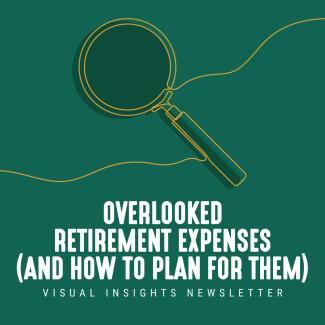
Overlooked Retirement Expenses (And How to Plan for Them)
A comfortable retirement doesn’t come with a fixed price tag.
Expenses can change over time, and some of the most important ones are easy to overlook.
That’s one reason about 45% of retirees could run out of money in retirement.1
The good news? That outcome isn’t inevitable. The key is recognizing which costs get overlooked and building flexibility into your plan.
Let’s explore five common blind spots and what you can do to prepare.
1. Overspending Day to Day
Small spending shifts can snowball quickly in retirement.
Recent data shows that nearly 1 in 3 retirees spend more than they can afford—a rate almost double that of 2020.2 Meanwhile, just 59% keep at least three months of emergency savings, and more than one-third face surprise expenses that strain their budgets.2
For many retirees, the challenge isn’t just inflation. Lifestyle changes, family support, or higher everyday costs can all make budgets tighter than expected
Planning tip: Track spending carefully, revisit your budget often, and leave room for surprises. A flexible plan can help you enjoy retirement without sacrificing long-term security.
2. Underestimating Healthcare Costs
Healthcare is one of the most underestimated retirement expenses. Even with Medicare, out-of-pocket costs for premiums, prescriptions, and uncovered services can be significant.
- A 65-year-old retiring in 2025 could expect to spend about $172,500 on healthcare alone, excluding long-term care.3
- Health care is among the largest retirement expenses, typically second only to housing.4
- Long-term care is even more daunting: a private nursing home room averaged $127,750 per year in 2024, while assisted living cost about $70,800.5
Planning tip: Model realistic healthcare scenarios into your plan and revisit them regularly. Consider supplemental coverage, long-term care planning, and a medical expense cushion.
3. Overlooking Housing Expenses
Even if the mortgage is paid off, housing costs don’t disappear.
In 2021, more than 11.2 million older adults spent at least 30% of their income on housing—a record high and a 15.5% increase since 2016.6
Add in maintenance, rising property taxes, unexpected repairs, and potential relocation costs, and housing can take a bigger bite than planned.
Planning tip: Anticipate both predictable costs (insurance, utilities) and the big-ticket surprises (repairs, moves). That foresight can give you flexibility to live where—and how—you want.
4. Supporting Adult Children
Good intentions can quietly drain retirement savings.
About 50% of parents routinely provide financial support to adult children—averaging $1,474 a month.7 Most of that goes to essentials like groceries, healthcare, and housing.
But here’s the tradeoff: many parents say they would deplete retirement savings, delay retirement, or even return to work to keep helping their kids.7
Planning tip: Decide ahead of time how and when you’re willing to provide support. Setting boundaries preserves your independence while still allowing you to help loved ones.
5. Ignoring Hidden Tax Triggers
Taxes don’t retire when you do. Without a strategy, they can take a serious toll.
- RMDs: Miss a required minimum distribution? You could face a 25% excise tax (10% if corrected within two years).8
- Social Security: Claiming at 62 instead of full retirement age can permanently reduce monthly benefits by ~30%.9
- IRMAA: Higher incomes can trigger surcharges on Medicare Part B and D premiums, potentially adding hundreds or thousands per year.10
Planning tip: Build a proactive tax strategy before retirement. Coordinating withdrawals, Social Security timing, and Medicare planning can help you keep more of what you’ve earned.
The Bigger Picture
Retirement planning isn’t about eliminating every risk. It’s about preparing for both the known and the unknown.
Inflation, travel splurges, unexpected caregiving, new diagnoses, even scams targeting older adults—all can reshape your retirement costs.
The goal is resilience: a plan flexible enough to absorb shocks without throwing your lifestyle off track.
Regularly review your plan, adjust when life changes, and know that preparation today creates more freedom tomorrow.
Sources:
- Morningstar, 2025 [URL: https://www.morningstar.com/news/marketwatch/20250816201/most-boomers-and-gen-x-ers-are-terrified-about-running-out-of-money-in-retirement-even-if-theyre-already-retired]
- EBRI, 2024 [URL: https://www.ebri.org/content/2024-spending-in-retirement-study-uncovers-concerning-trends-on-dampened-spending-expectations-due-to-lack-of-sufficient-savings--inflationary-pressures-and-rising-credit-card-debt]
- Fidelity, 2025 [URL: https://newsroom.fidelity.com/pressreleases/fidelity-investments--releases-2025-retiree-health-care-cost-estimate--a-timely-reminder-for-all-gen/s/3c62e988-12e2-4dc8-afb4-f44b06c6d52e]
- Kiplinger, 2025 [URL: https://www.kiplinger.com/retirement/average-cost-of-health-care-by-age]
- Genworth, 2025 [URL: https://assets.carescout.com/55da049c1f/282102.pdf]
- Joint Center for Housing Studies of Harvard University, 2023 [URL: https://www.jchs.harvard.edu/sites/default/files/reports/files/Harvard_JCHS_Housing_Americas_Older_Adults_2023.pdf]
- Savings.com, 2025 [URL: https://www.savings.com/insights/financial-support-for-adult-children-study]
- IRS, 2025 [URL: https://www.irs.gov/retirement-plans/retirement-plan-and-ira-required-minimum-distributions-faqs]
- Social Security Administration (SSA), 2025 [URL: https://www.ssa.gov/pubs/EN-05-10024.pdf]
- SSA, 2024 [URL: https://secure.ssa.gov/poms.nsf/lnx/0601101020]
Disclosure: This content is developed from sources believed to be providing accurate information. The information provided is not written or intended as tax or legal advice and may not be relied on for purposes of avoiding any Federal tax penalties. Individuals are encouraged to seek advice from their own tax or legal counsel. Individuals involved in the estate planning process should work with an estate planning team, including their own personal legal or tax counsel. Neither the information presented nor any opinion expressed constitutes a representation by us of a specific investment or the purchase or sale of any securities. Asset allocation and diversification do not ensure a profit or protect against loss in declining markets. This material was developed and produced by Advisor Websites to provide information on a topic that may be of interest. Copyright 2025 Advisor Websites.

